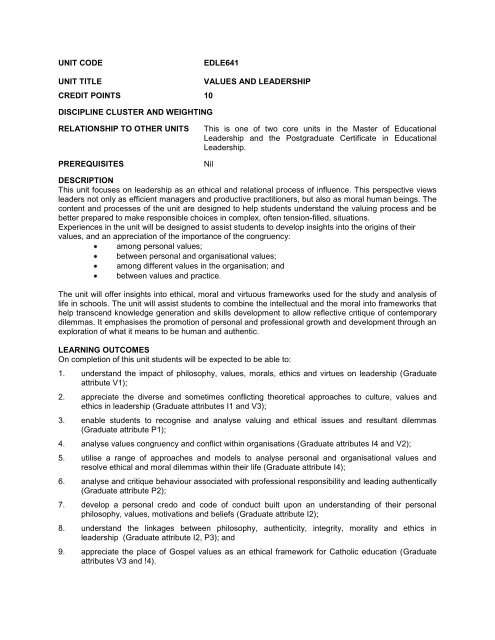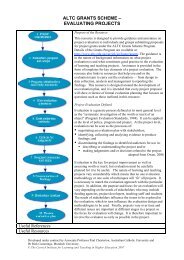UNIT CODE EDLE641 UNIT TITLE VALUES AND LEADERSHIP ...
UNIT CODE EDLE641 UNIT TITLE VALUES AND LEADERSHIP ...
UNIT CODE EDLE641 UNIT TITLE VALUES AND LEADERSHIP ...
Create successful ePaper yourself
Turn your PDF publications into a flip-book with our unique Google optimized e-Paper software.
<strong>UNIT</strong> <strong>CODE</strong> <strong>EDLE641</strong><br />
<strong>UNIT</strong> <strong>TITLE</strong> <strong>VALUES</strong> <strong>AND</strong> <strong>LEADERSHIP</strong><br />
CREDIT POINTS 10<br />
DISCIPLINE CLUSTER <strong>AND</strong> WEIGHTING<br />
RELATIONSHIP TO OTHER <strong>UNIT</strong>S This is one of two core units in the Master of Educational<br />
Leadership and the Postgraduate Certificate in Educational<br />
Leadership.<br />
PREREQUISITES Nil<br />
DESCRIPTION<br />
This unit focuses on leadership as an ethical and relational process of influence. This perspective views<br />
leaders not only as efficient managers and productive practitioners, but also as moral human beings. The<br />
content and processes of the unit are designed to help students understand the valuing process and be<br />
better prepared to make responsible choices in complex, often tension-filled, situations.<br />
Experiences in the unit will be designed to assist students to develop insights into the origins of their<br />
values, and an appreciation of the importance of the congruency:<br />
among personal values;<br />
between personal and organisational values;<br />
among different values in the organisation; and<br />
between values and practice.<br />
The unit will offer insights into ethical, moral and virtuous frameworks used for the study and analysis of<br />
life in schools. The unit will assist students to combine the intellectual and the moral into frameworks that<br />
help transcend knowledge generation and skills development to allow reflective critique of contemporary<br />
dilemmas. It emphasises the promotion of personal and professional growth and development through an<br />
exploration of what it means to be human and authentic.<br />
LEARNING OUTCOMES<br />
On completion of this unit students will be expected to be able to:<br />
1. understand the impact of philosophy, values, morals, ethics and virtues on leadership (Graduate<br />
attribute V1);<br />
2. appreciate the diverse and sometimes conflicting theoretical approaches to culture, values and<br />
ethics in leadership (Graduate attributes I1 and V3);<br />
3. enable students to recognise and analyse valuing and ethical issues and resultant dilemmas<br />
(Graduate attribute P1);<br />
4. analyse values congruency and conflict within organisations (Graduate attributes I4 and V2);<br />
5. utilise a range of approaches and models to analyse personal and organisational values and<br />
resolve ethical and moral dilemmas within their life (Graduate attribute I4);<br />
6. analyse and critique behaviour associated with professional responsibility and leading authentically<br />
(Graduate attribute P2);<br />
7. develop a personal credo and code of conduct built upon an understanding of their personal<br />
philosophy, values, motivations and beliefs (Graduate attribute I2);<br />
8. understand the linkages between philosophy, authenticity, integrity, morality and ethics in<br />
leadership (Graduate attribute I2, P3); and<br />
9. appreciate the place of Gospel values as an ethical framework for Catholic education (Graduate<br />
attributes V3 and !4).
On successful completion of this unit, students will have progressed in the development of the following<br />
ACU graduate attributes:<br />
Intellectual<br />
I1. critical and analytical abilities<br />
I2 enthusiasm to search for further knowledge and understanding<br />
I3 open-mindedness and receptiveness to new ideas<br />
I4 expertise in chosen academic field.<br />
Professional<br />
Values<br />
P1 knowledge and skills to meet relevant professional requirements<br />
P2 understanding of and commitment to professional ethical standards<br />
P3 information literacy, communication and interpersonal skills.<br />
V1 commitment to values consistent with the University’s Mission<br />
V2 a spirit of service to the community<br />
V3 commitment to good citizenship, including respect for individuals, empathy with persons of<br />
differing cultural and religious backgrounds, community responsibility and concern for the<br />
environment<br />
V4 a high regard for equity and human rights in the context of a broad understanding of globalization.<br />
CONTENT<br />
Topics will include:<br />
Leading as a relational process of influence<br />
Leading as a philosophical, moral, valuational, cultural and ethical process<br />
The role of values, beliefs, motivations and virtues in ethical behaviour<br />
Ethical and moral reasoning in the context of educational leadership<br />
Frameworks and models for ethical decision-making in schools<br />
Classical and contemporary approaches to the study of valuing and ethical leadership: The Greeks,<br />
Hodgkinson, Starratt, Shapiro and Stefkovich, and Branson<br />
Moral literacy and problematics in schools<br />
Development of a personal philosophy and code of ethics for leading<br />
The relationship of valuing and ethics to principle-centred, moral, creative, servant and authentic<br />
approaches leadership<br />
Development of a personal and professional platform based on an alignment of values, beliefs,<br />
motivations and behaviours.<br />
TEACHING ORGANISATION<br />
In addition to lectures on the key concepts found in the literature, there will be opportunities for group<br />
discussion, private reflection and practical activities. Face-to-face teaching, conventional distance<br />
education materials and electronic modes of delivery may also be used. These methods will allow<br />
students to participate in an intense dialogue, using a variety of investigative methodologies, sorting<br />
through various sources and types of evidence to identify underlying patterns, structure or significance.<br />
These methods are also intended to engage students as active participants in the learning process and<br />
encourage them to become independent learners. There will be respect for students’ views and<br />
responses, an understanding of an individual's knowledge, capabilities and backgrounds and a concern<br />
for the welfare and progress of individual students.
ASSESSMENT<br />
There will be two or three assignments totalling 5,500 words. Length will depend on weighting.<br />
Assignment one is compulsory and students can elect to do either or both assignment two and three.<br />
Overview of Assessments<br />
Brief Description of Assessment<br />
Tasks<br />
Assignment one<br />
Personal reflection task based on analysis<br />
of values with implications for learning for<br />
leadership.<br />
Assignment two<br />
Analysis of organised situations requiring<br />
use of models of choice and ethical issue.<br />
Assignment three<br />
Negotiate personal, scholarly project with<br />
a focus on leadership.<br />
Weighting % Learning<br />
Outcome/s<br />
Assessed<br />
40% 1, 3, 4, 6, 7.<br />
30% or 60%<br />
30% or 60%<br />
2, 3, 4, 5, 6, 7,<br />
8.<br />
2, 3, 4, 5, 6, 7,<br />
8.<br />
Graduate<br />
Attributes/<br />
Generic Skills<br />
(i.e. I3, V1 etc)<br />
I1.I2, I3, P2 ,<br />
V2, V4<br />
I1,!4,P1, P2,<br />
V1, V2,<br />
V4<br />
I1,14,P1, P2, V1,<br />
V2, V4<br />
In order to satisfy requirements for this unit, students are expected to submit all assessment tasks and<br />
to participate in classes and/or prescribed online activities.<br />
REPRESENTATIVE REFERENCES<br />
Begley, P.T., & Johaansson. O. (Eds.). (2003). The ethical dimensions of school leadership, Boston:<br />
Kluwer Academic Publishers<br />
Begley, P. (2006). Self knowledge, capacity and sensitivity: Prerequisites to authentic leadership by<br />
school principals. Journal of Educational Administration, 44(6), pp. 35-52.<br />
Branson, C .M. (2006). Beyond authenticity: Contemporary leadership from a world view perspective,<br />
Values and Ethics in Educational Administration, 4(4).<br />
Branson, C. M. (2005). Exploring the concept of values-led principalship, Leading and Managing, 11(1),<br />
pp.14-31.<br />
Cacioppe, R., & Edwards, M. (2005). Seeking the holy grail of organisational development: A synthesis of<br />
integral theory, spiral dynamics, corporate transformation and action inquiry. Leadership and<br />
Organization Development Journal, 26 (2), pp.86–105.<br />
Duignan, P. (2007). Educational leadership: Key challenges and ethical tensions. Sydney: Cambridge<br />
University Press.<br />
Duignan, P., Benjamin A., Burford, C., Collins, V., Cresp, M., d’Arbon, T., et al. Contemporary challenges<br />
and implications for leaders in frontline human service organisations (SOLR). Sydney: Australian<br />
Catholic University.<br />
Duigan, P., Butcher, J., Spies-Butcher, B., & Collins, J. (2005). Socially responsible indicators: A<br />
framework for action in service organisations. Sydney: Australian Catholic University.<br />
Henderson, M., & Thompson, D. (2003). Values at work: The invisible threads between people,<br />
performance and profit. Auckland: Harper Collins.<br />
Hodgkinson, C. (2002). Victoria’s secret: A rejoinder and an agenda. Values and Ethics in Educational<br />
Administration Journal, 1(2), pp.1-7.<br />
Hultman, K., & Gellermann, B. (2002), Balancing individual and organizational values: Walking the<br />
tightrope to success. San Francisco: Jossey-Bass/Pfeiffer.<br />
McGraw, P. C. (2001). Self matters: Creating your life from the inside out, New York: Simon and Schuster<br />
Source.
Shapiro, J., & Stefkovich, J. (2005). Ethical leadership and decision making in education: Applying<br />
theoretical perspectives to complex dilemmas (2 nd ed.). Mahway, NJ: Lawrence Erlbaum<br />
Associates.<br />
Starratt, R. J. (1994). Building an ethical school: A practical response to the moral crisis in schools.<br />
London: Falmer Press.<br />
Starratt, R. J. (2004). Ethical leadership. San Francisco: Jossey Bass.<br />
Taylor, C. (1991). The ethics of authenticity. Cambridge, MA: Harvard University Press.<br />
Tuana, N. (2007). Conceptualising moral literacy. Journal of Educational Administration, 45(4), p.p. 364-<br />
378.<br />
Walker, A. (2003). Developing cross-cultural perspectives on education and community. In P.T. Begley, &<br />
O. Johansson. (Eds.) The ethical dimensions of school leadership. Dordrecht: Kluwer Academic<br />
Press, pp. 145-160.











